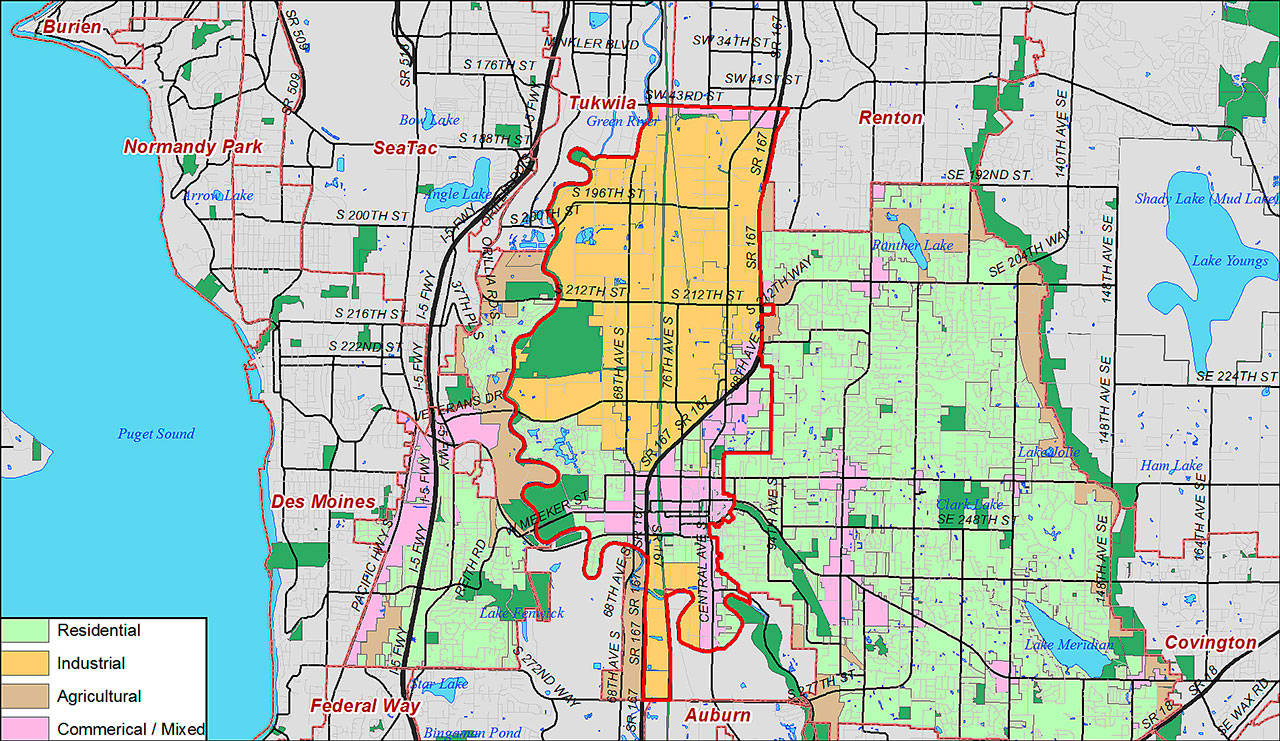City leaders want to transform Kent’s industrial valley into a place where companies choose to set up headquarters and production plants rather than more warehouses and distribution centers.
Mayor Dana Ralph foresees the change as comparable to when the Howard Hanson Dam was built along the Green River in the 1960s and Boeing built its space center that turned the valley from a farming community into an industrial zone full of warehouses.
“Every time I stop and think about what we are doing here with this industrial valley plan, I think way back 40 or 50 years ago there was a council and mayor sitting up here, and they were making these kind of decisions that defined the valley as we knew it,” Ralph said at a City Council workshop on Tuesday night. “They were bold decisions. We covered up a lot of farmland to build these warehouses.
“But if we stop and think about what those buildings did for us, they developed our city. They made us the third largest city in King County. They provided jobs for our grandparents, our parents and a lot of us. … We are so fortunate to be sitting here now getting to make those same kind of decisions. The decisions we are making collectively are going to set the tone for what our future looks like.
“We can let things continue to happen or make some deliberate, strategic decisions. … It is very exciting to me. This is us changing the trajectory of our future. We are all taking our place in this piece of history in Kent and we’ve got a lot to be really proud of in how we are going to move this forward.”
Kent is looking to attract more companies similar to Blue Origin (the Jeff Bezos-owned rocket manufacturing firm for space travel) with higher-paying jobs rather than more low-paying warehouse jobs and businesses that fill the roads with large trucks. Blue Origin employs more than 1,500, the city’s largest private sector employer, according to the Puget Sound Regional Council.
The city also needs companies to replace the loss of thousands of Boeing Space Center jobs as the firm continues to lower its presence in Kent. Boeing sold off land several years ago that led to the 2016 opening of the Amazon fulfillment center, and has more property to sell. Kent also will lose REI, the outdoor gear and apparel company, which is moving its headquarters and more than 1,000 jobs to Bellevue by 2020.
“The Boeing Space Center is declining – from 5,500 employees at its height – to about 500 today and we are facing REI’s departure in a few years,” said Bill Ellis, city economic development manager, in a report Tuesday to the council.
Ellis used the city of Fremont, Calif., as an example of a potential path for Kent to follow because of its similarities. Fremont lost 4,000 jobs in 2010 when New United Motor Manufacturing closed its plant. The company manufactured cars for Toyota and General Motors.
Fremont decided to change its rail yard area into an innovation district, rezoned to allow mixed use and uniting land use, parks, transportation and school planning.
“They scored a Tesla factory, those high-level, high-wage jobs,” Ellis said.
Tesla opened its factory in 2010 at the former New United Motor Manufacturing site.
“They looked at whether there should be on-street parking in the industrial area, bicycle lanes and to open up industrial buildings to let people see what is happening in these boxes,” Ellis said. “They worked with the school district and placed an elementary school in the industrial area.”
Ellis said a large mixed-use housing and retail plaza has now come into the area. Fremont took a holistic approach to look at open space, land use, parks, public art and ways to support what comes next.
City staff will work to develop a Kent Industrial Valley Subarea Plan to transform the area that employs more than 60,000 and makes up one-third of the city’s property tax base. Staff will work with companies already here and those in the region to help figure out how to attract more businesses.
It could be more rocket space companies coming to town.
“If you have something distinctive, birds of a feather would like to flock together, and it will draw others to it if we set the table appropriately for them,” Ellis said.
Companies look at cost and even commuting time by the owner of a firm as far as where to locate. But business owners also like locating near competitors.
“If similar companies are nearby, it helps them have confidence they can hire people,” Ellis said. “It’s about who your neighbors are and how skilled they are and are they potential customers – a ecosystem of businesses.”
Council President Bill Boyce looks forward to see how things transform in the industrial valley.
“We have the opportunity to reposition,” Boyce said. “What can we do to make a deliberate decision about what we want that valley to be five, 10 or 15 years down the road. … There are a lot of changes beginning to take place about what the industrial valley will look at in the future.”
Talk to us
Please share your story tips by emailing editor@kentreporter.com.
To share your opinion for publication, submit a letter through our website https://www.kentreporter.com/submit-letter/. Include your name, address and daytime phone number. (We’ll only publish your name and hometown.) Please keep letters to 300 words or less.

